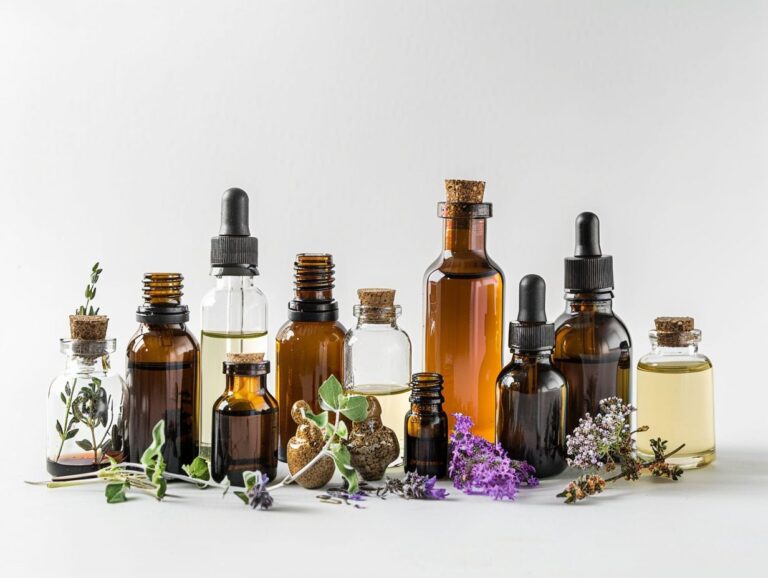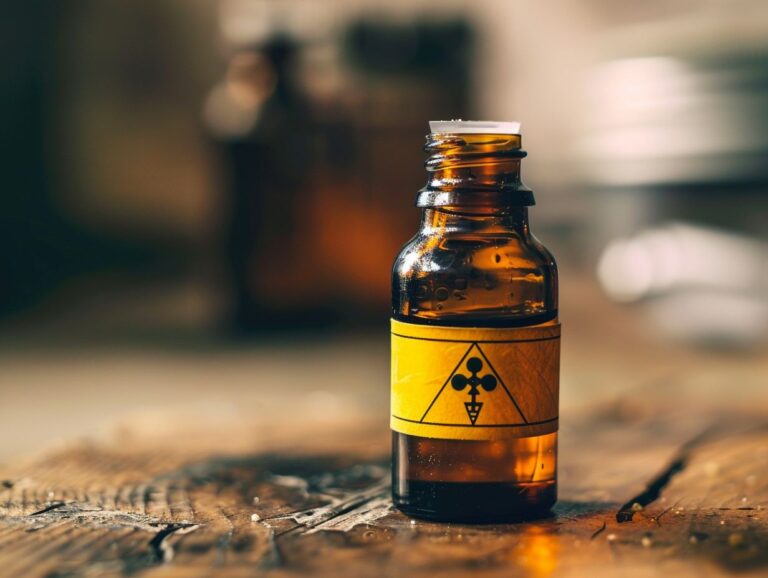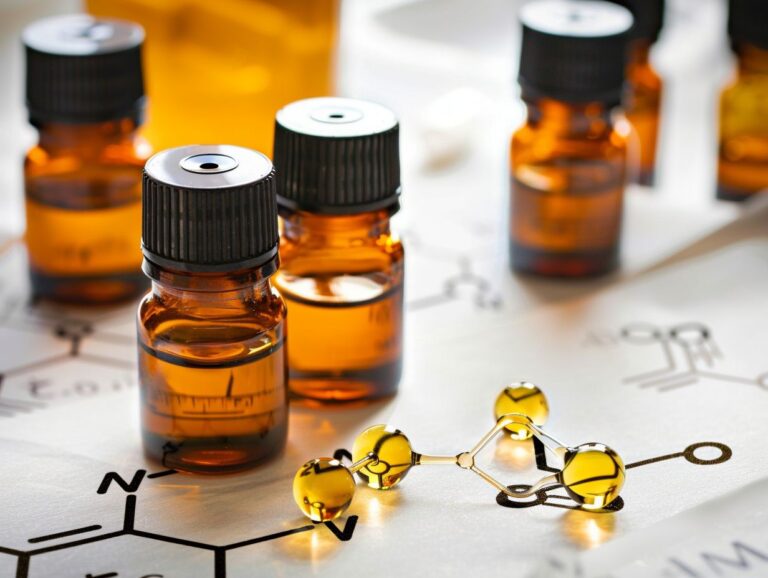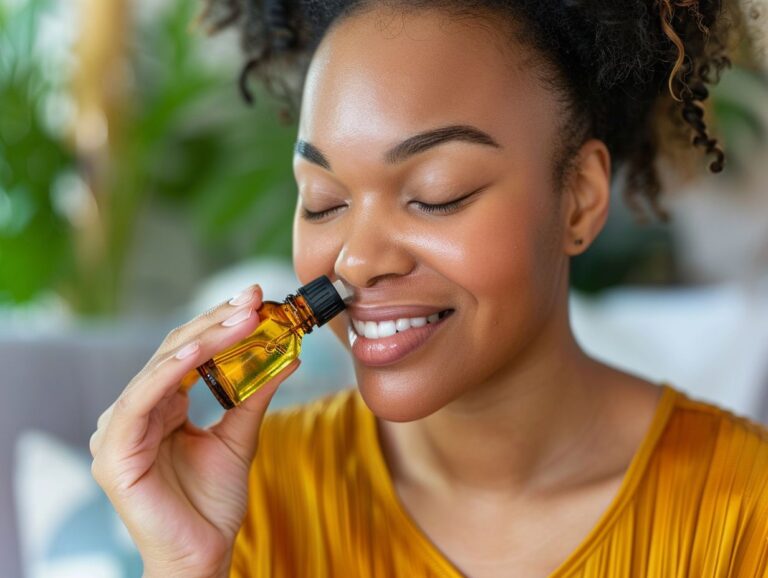What Can I Do With Old Essential Oils
Have you ever wondered what to do with old essential oils that have passed their expiration date? Whether you have a collection of expired oils or are just curious about their shelf life, this article will provide you with all the information you need.
Identifying signs of expired essential oils and exploring the risks of using them past their prime will be covered. Additionally, creative ways to repurpose old oils for cleaning, beauty products, aromatherapy, and more will be shared.
So, grab your oils and let’s dive in!
Key Takeaways:
What Are Essential Oils?
Essential oils are concentrated extracts derived from various plants, flowers, and herbs through distillation or cold-press methods. They are known for their aromatic properties and are often used in aromatherapy, skincare, and cleaning products.
Each essential oil has its unique composition that contributes to different therapeutic effects. For instance, lavender is renowned for its calming properties, while peppermint is energizing. Combining oils like lavender, peppermint, and eucalyptus can create a refreshing blend ideal for promoting focus and relaxation. These blends can be utilized in diffusers, massage oils, or even homemade candles to enhance the ambiance of a room. Incorporating essential oils into daily routines can also help reduce stress, improve mood, and boost overall well-being.
How Long Do Essential Oils Last?
The shelf life of essential oils varies depending on the type of oil and how it is stored. Generally, most essential oils can last from 1 to 3 years when stored properly in a cool, dark place.
Several factors can impact the longevity of essential oils, including exposure to light, heat, and air. Citrus oils, such as lemon and orange, are more prone to oxidation due to their high limonene content, leading to a shorter shelf life. In contrast, essential oils like lavender and tea tree tend to have a longer shelf life because of their more stable chemical composition. To extend the shelf life of essential oils, make sure to keep them tightly sealed in dark glass bottles, away from sunlight and heat sources. Storing them in the refrigerator can further prolong their freshness.
What Are the Signs of Expired Essential Oils?
Expired essential oils may exhibit signs such as a change in color, the presence of sediment, a rancid smell, or a weakened scent profile. Checking the expiration date on the bottle is crucial to determine if the oil is still suitable for use.
When an essential oil changes color, it could indicate that it has oxidized or degraded over time. Sediment in the bottle may suggest contamination or chemical breakdown. The most distinct indicator of an expired essential oil is the development of a rancid smell, which can be off-putting and unpleasant.
A weakened scent profile may mean that the oil has lost some of its therapeutic properties, making it less effective. To ensure the best quality and efficacy, always make it a habit to check the expiration dates on your essential oil bottles before use.
What Happens When Essential Oils Expire?
When essential oils expire, their chemical composition may change, leading to a loss of potency and potential irritation when applied to the skin. Expired oils may also not deliver the intended therapeutic benefits.
Using expired essential oils can pose risks beyond just reduced efficacy. Skin reactions such as rashes, redness, or even burns may occur due to the altered chemical structure of expired oils. The potential allergens in expired oils might trigger adverse reactions, especially in individuals with sensitive skin or allergies.
It is crucial to be vigilant and check the expiration dates of essential oils before use to avoid these undesirable consequences.
Can You Use Expired Essential Oils?
Using expired essential oils is not recommended, as they may have lost their therapeutic properties and could potentially cause skin irritations or adverse reactions when diffused or applied.
When essential oils expire, oxidation occurs, leading to a breakdown of the active compounds that provide the health benefits.
It is crucial to check the expiration dates on your essential oil bottles to ensure their efficacy and safety.
If you notice changes in the color, consistency, or smell of the oil, it’s a clear indication that it has expired.
Safe alternatives include using fresh essential oils uses or exploring carrier oils like jojoba or coconut oil for skincare and aromatherapy.
For proper disposal of expired oils, you can mix them with a carrier oil to dilute and then dispose of them in a waste container according to local regulations.
Are There Any Risks in Using Expired Essential Oils?
Using expired essential oils can pose risks such as skin sensitivities, allergic reactions, or toxicity, especially when exposed to pets or children. It is essential to prioritize safety when handling expired oils.
When essential oils expire, their chemical composition changes, leading to potential adverse effects when used on the skin. This can be even more concerning when it comes to pets and children, who might be more sensitive to these changes. Exposure to expired oils could trigger skin irritations, respiratory issues, or even poisoning. It’s crucial to store essential oils properly away from sunlight and heat to prolong their shelf life.
Always check the expiration date before using any essential oil and discard any that have passed their prime. If accidental ingestion occurs, contact a poison control center or seek medical help immediately. Being aware of the dangers associated with expired essential oils is key to keeping your loved ones, including your furry friends, safe and healthy.
What Can I Do With Old Essential Oils?

Old essential oils can be blended to create unique scents for homemade candles or room sprays, adding a personalized touch to your living space. Consider incorporating them into your skincare routine by mixing a few drops with carrier oils like jojoba or coconut for a nourishing facial serum.
For a natural and eco-friendly scent boost, simply add a few drops of old essential oils to a diffuser or pot of simmering water to freshen up your home without the need for artificial fragrances.
Use Them for Cleaning
Old essential oils can be effectively used for natural cleaning solutions when combined with ingredients like baking soda. They can help freshen up spaces and remove odors without the use of harsh chemicals.
For instance, using a mixture of lemon essential oil and vinegar can create a powerful all-purpose cleaner perfect for kitchen countertops. The antibacterial properties of essential oils like tea tree or eucalyptus make them great additions to homemade cleaning sprays. Adding a few drops of lavender oil to laundry detergent can impart a fresh scent to clothes while effectively eliminating odor-causing bacteria. Remember to dilute essential oils properly to avoid skin irritation and always test a small patch before using on surfaces.
Create DIY Beauty Products
Repurpose old essential oils by incorporating them into DIY beauty products such as facial serums, body scrubs, or hair treatments. Blending oils with carrier oils and skin-friendly ingredients can cater to various skincare needs and age groups.
Essential oils offer a multitude of benefits for the skin due to their natural rejuvenating and healing properties. For anti-aging purposes, consider creating a hydrating facial serum by mixing rosehip oil with frankincense and rejuvenating lavender. Alternatively, concocting a gentle exfoliating body scrub with coconut oil and citrus essential oils can leave the skin refreshed and glowing.
When crafting hair treatments, opt for a revitalizing blend of jojoba oil with peppermint and rosemary to stimulate hair growth and enrich the scalp. The versatility of essential oils allows customization based on personal preferences and specific skin concerns, making them a versatile asset in any homemade beauty product arsenal.
Use Them as Air Fresheners
Transform old essential oils into natural air fresheners by diffusing them or creating DIY room sprays. The aromatic blend can elevate the ambiance of any space while providing therapeutic benefits.
When utilizing old essential oils for creating air fresheners, consider crafting your own diffuser blends for a continuous release of pleasant scents. Aromatherapy experts suggest combining calming lavender with invigorating peppermint for a refreshing effect, or mixing citrus oils like orange and bergamot for a mood-boosting aroma.
If you prefer room sprays, a simple recipe could involve mixing water with a few drops of essential oils in a spray bottle. You can experiment with combinations like eucalyptus and tea tree for a purifying mist, or rose and jasmine for a luxurious floral scent.
Make Natural Insect Repellents
Old essential oils can be repurposed as natural insect repellents to deter pests while avoiding harmful chemicals that may be harmful to pets or the environment.
When blending oils for insect repellents, it is essential to consider the properties of each oil. For example, citronella
- is known for its mosquito-repelling abilities,
- while eucalyptus oil can keep away flies and even ticks.
Pairing these oils with carrier oils like coconut or almond oil not only dilutes the potent essential oils but also helps them spread effectively. Adding a few drops of lavender oil can provide a soothing scent while enhancing the repelling power of the blend. Experimenting with different combinations can lead to custom-made, safe, and effective insect repellents for your home and pets.
Add Them to Bath or Foot Soaks
Enhance your bath or foot soak experience by adding old essential oils for a luxurious and aromatic spa-like treatment. The oils can promote relaxation, relieve stress, and rejuvenate tired muscles.
If you are looking to create a calming environment, consider using lavender or chamomile oils. These soothing scents can help to ease anxiety and promote deep relaxation.
For a revitalizing soak to energize your senses, opt for invigorating oils like peppermint or eucalyptus.
When blending oils, remember to dilute them properly in a carrier oil to avoid skin irritation. A general rule of thumb is to use about 5 drops of essential oil per 1 ounce of carrier oil. Experiment with different blends to find what works best for you!
Use Them for Aromatherapy
Utilize old essential oils for aromatherapy purposes by diffusing them in an oil diffuser to create a calming and fragrant atmosphere. The scents can help promote relaxation, improve focus, and uplift moods.
Old essential oils, known for their rich history and potent therapeutic properties, offer a natural and holistic approach to enhance well-being. Through the gentle release of these fragrant oils into the air via diffusion, the olfactory system is engaged, triggering various physiological responses in the body.
Aromatherapy is not only about pleasant scents; it can also support emotional balance, alleviate stress, and even aid in better sleep quality. By blending different essential oils strategically, you can tailor your aromatherapy experience to address specific needs or preferences.
Donate Them to Charity

Unused essential oils can have a significant impact when given to those in need, helping individuals access the benefits of aromatherapy or promoting a healthier environment. By choosing to donate, one can contribute to the well-being of others and make a positive difference in their community.
Organizations such as Healing Hands Foundation and AromaCare Outreach accept essential oil donations, using them to create blends for various charitable causes, including supporting mental health programs, eco-friendly initiatives, or aiding families in crisis.
How Can I Properly Store Essential Oils to Extend Their Shelf Life?
Proper storage is essential to extend the shelf life of essential oils. Keep them in a cool, dark place away from sunlight and moisture, preferably in dark glass bottles to preserve their potency and therapeutic properties.
Carrier oils can help dilute essential oils and enhance their benefits. To store a blend, ensure the lid is tightly sealed to prevent oxidation and leakage.
It is vital to label each bottle with the date and contents
for easy identification and monitoring of expiry. Avoid placing essential oils near heat sources or in areas with temperature fluctuations. Utilize a storage box or rack with dividers to keep bottles organized and prevent breakage. Regularly check for any signs of spoilage or changes in aroma to ensure the oils are still in prime condition.
Keep Them in a Cool, Dark Place
Store essential oils in a cool, dark place to prevent exposure to heat and light, which can degrade the oils and shorten their shelf life. Maintaining proper storage conditions is crucial for preserving the oils’ integrity.
Temperature and light play vital roles in the longevity of essential oils. High temperatures can cause the oils to oxidize faster, leading to a loss of their therapeutic properties. Similarly, exposure to light can break down the aromatic compounds in the oils, diminishing their effectiveness over time. Explore essential oil crafts to make the most of your old oils.
When selecting a storage location for your essential oils, opt for a dark cabinet or drawer away from direct sunlight. Consider using amber or dark-colored glass bottles to further shield the oils from light exposure. Ensure the storage area remains consistently cool to prevent fluctuations that could impact the oil quality.
Use Dark Glass Bottles
Opt for dark glass bottles when storing essential oils as they provide protection against light exposure, which can accelerate oil degradation. The opaque containers help maintain the oils’ stability and prolong shelf life.
Dark glass bottles, typically amber or cobalt blue in color, are excellent choices for storing essential oils due to their ability to block out harmful UV rays that can break down the aromatic compounds within the oils. This shielding quality helps to preserve the oils’ integrity and effectiveness over time, ensuring that they retain their therapeutic properties.
Amber glass, in particular, is commonly recommended for its superior ability to protect oils from light damage. It is also advisable to opt for glass bottles with dark-colored dropper caps to further minimize light exposure when dispensing the oils.
Avoid Exposure to Sunlight and Heat
Shield essential oils from direct sunlight and heat sources to prevent oxidation and deterioration. Exposure to UV rays and high temperatures can compromise the oils’ quality and reduce their effectiveness over time.
One effective way to safeguard your essential oils is by storing them in dark, amber-colored glass bottles that can help filter out harmful UV light. Consider placing the bottles in a cool, dark cabinet or drawer away from windows and direct sunlight. This simple step can significantly prolong the shelf life and potency of your oils, ensuring that they remain potent and beneficial for longer periods.
Keep Them Away from Moisture
Moisture can degrade essential oils and accelerate their expiration. Ensure the storage area is dry and free from humidity to preserve the oils’ potency and prevent contamination.
Exposure to moisture can lead to chemical reactions within essential oils, altering their composition and diminishing their therapeutic benefits. To mitigate these risks, it is crucial to store your oils in tightly sealed containers made of dark glass to shield them from light and moisture infiltration. Incorporating silica gel packets in your storage area can help absorb excess moisture, maintaining a stable environment for your oils. Implementing a dehumidifier in the storage space can also assist in regulating humidity levels and preventing condensation, safeguarding the quality of your essential oils.
Use Them Regularly
Regular usage of essential oils can help maintain their freshness and efficacy by preventing stagnation and oxidation. Incorporating oils into daily routines ensures they are utilized before their shelf life expires.
One effective way to integrate essential oils into your daily rituals is by infusing them into your skincare routine. For instance, adding a drop of lavender oil to your moisturizer can enhance its calming properties. Incorporating a few drops of peppermint oil into your shampoo can invigorate your scalp and promote healthy hair. Inhaling the aroma of eucalyptus oil before bedtime can also promote relaxation and improve sleep quality.
Frequently Asked Questions
What Can I Do With Old Essential Oils?
There are actually quite a few things you can do with old essential oils! Here are six ideas to get you started:
Can I Still Use Old Essential Oils?
While essential oils do have a long shelf life, they can eventually lose their potency and effectiveness. If your oils have been stored properly and still smell strong and fresh, then they are probably still safe to use. However, if they have a weak or unpleasant scent, it may be time to replace them.
Can I Make New Blends with Old Essential Oils?
Absolutely! You can mix old essential oils with new ones to create unique blends and scents. Just make sure to test the new blend on a small patch of skin to ensure there are no adverse reactions before using it on a larger area.
What are Some DIY Projects I Can Do with Old Essential Oils?
You can use old essential oils to make your own natural cleaning products, beauty products, and even air fresheners. There are plenty of online resources and tutorials available for these types of projects.
How Should I Store My Essential Oils to Extend Their Shelf Life?
The best way to store essential oils is in a cool, dark place. Avoid exposure to direct sunlight or heat, as this can cause the oils to deteriorate more quickly. Also, make sure to keep the lids tightly closed to prevent oxidation.
What Should I Do with Essential Oils That Have Expired?
If your essential oils have expired or gone bad, it’s best to dispose of them properly. You can contact your local waste management department to find out how to safely dispose of essential oils in your area.
Can Old Essential Oils Be Harmful?
While old essential oils may not be harmful, they may not be as effective as fresh oils. However, if the oils have been stored improperly and have gone rancid, they can potentially cause skin irritations or other adverse reactions. It’s always best to err on the side of caution and replace old oils when in doubt.








